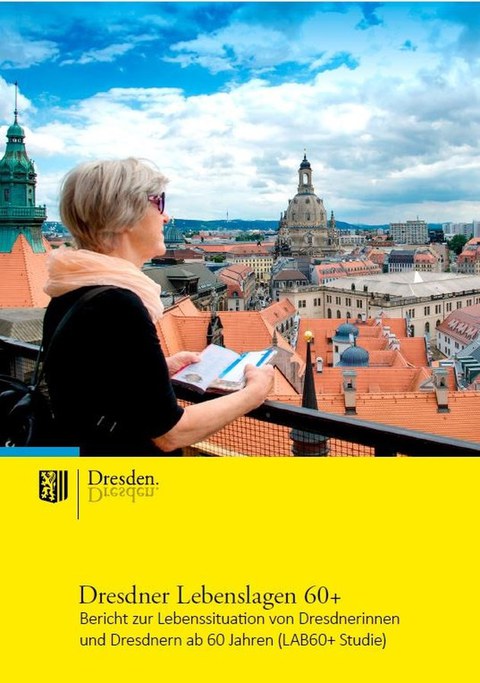Jan 19, 2022
How are older people doing in Dresden?
City and university present new study on the living situation of people aged 60 and over.
More low-barrier living space in the city, level and better-lit pavements, open spaces suitable for senior citizens - these are the wishes of many older Dresdeners. These and other findings are the result of the "Study on the Living Situation of Dresden Residents over 60" (LAB60+), which the state capital Dresden and the Technical University of Dresden jointly prepared.
"More than every fourth person living in Dresden has been around for at least 60 years. But until recently we did not know what life situation these citizens are in, what ideas they have of a good living and residential environment. There was also a lack of knowledge about their central goals in life, their fears and wishes for the city. Therefore, we randomly selected 6,000 Dresden citizens aged 60 and over - representative of their place of residence, gender and age group - and asked them how they assess their concrete, individual living situation in terms of health, housing and participation. In addition, we asked Dresden's care facilities about their capacity utilisation, staffing situation and current and future challenges," says Dr. Kristin Klaudia Kaufmann, the city's Commissioner for Labour, Social Affairs, Health and Housing. "With the first comprehensive study of this kind, we have taken an important step for the development of Dresden into an age-friendly city," says the mayor, classifying the study.
The scientific director of the study, Prof. Andreas Seidler, emphasises: "Older people naturally want to participate in life in their city. Our research proves this. The response rate of 40 percent in our survey underlines the great interest of the target group." Prof. Jürgen Wegge, who is also involved in the cooperation project between the city and the Technical University of Dresden, points out: "A very positive finding is that the experienced age discrimination in Dresden is low and the citizens identify strongly with the city of Dresden". And Prof. Gesine Marquardt emphasises: "Ultimately, all generations benefit from a differentiated housing offer and an age-appropriate design of the inner-city space."
Here are some further, selected results:
The vast majority of participants (94 percent) live in flats and houses with sometimes considerable structural or spatial barriers. However, the people concerned are not sufficiently aware of counselling centres and support services that can help them adapt their living space to the needs of the elderly or people with disabilities. The city is therefore planning campaigns to make housing counselling and possibilities for barrier-free design of housing better known.
The creation of barrier-free public spaces as well as age-appropriate open spaces and sufficient lighting of footpaths are a central need for Dresden's experienced residents. The city administration will examine which measures need to be prioritised.
The majority (63 percent) do not feel lonely and relatively well integrated into social groups. However, it is also a fact that about one third of the people surveyed feel somewhat to strongly lonely. The general sense of well-being in Dresden is below the German average. During the Corona pandemic, contacts were further reduced. It is therefore necessary to develop approaches and instruments that enable participation in cultural, social and civic life for all people aged 60 and over.
Many senior citizens are overweight. Healthy nutrition lags behind the recommendations, alcohol consumption is one third above the recommendations, especially among younger elderly people. Physical activity appears to be too low. Therefore, active healthy ageing remains an important field of action for the city.
The inpatient care facilities in Dresden are almost fully utilised (98 percent). The facilities describe the staff situation as strained. Innovative care concepts and sufficient places for people in need of care with special care needs are necessary. Furthermore, the providers would like to see an increase in the recruitment of skilled workers. For this purpose, an expert discourse is planned in the PflegeNetz Dresden and with the participating service providers.
The media use of the participants is very heterogeneous. As expected, older people in particular tend to use traditional media. Younger people use digital information channels and communication platforms to a large extent. For this reason, information should continue to be published in a way that is appropriate for the target group, and digital services should be further developed in a targeted manner so that they become more widely known and used.
Many participants volunteer or want to continue volunteering into old age, for example by helping out in their neighbourhood. Civic engagement supports the formation and maintenance of social networks. In the future, efforts should be made to expand target-group-oriented services close to home and to bring them together even better.
Dresden's path towards the creation and further development of an age-appropriate infrastructure is to be further developed. Many of the senior citizens' wishes are already anchored in the new specialist plan for senior citizens' work and assistance and will be further supplemented and deepened in the future. In order to make this possible, there will also be a regular survey in the future to continuously survey the needs of residents over the age of 60 and to adapt current developments and funding accordingly.
Further information on the cooperation project of the state capital Dresden with the Centre for Demography and Diversity (CDD) of the Dresden University of Technology, the Institute and Polyclinic for Occupational and Social Medicine, the Chair for Social and Health Buildings and the Chair for Occupational and Organisational Psychology can be found on the internet at
www.tu-dresden.de/cdd/forschung/lab60 and www.dresden.de/senioren.

